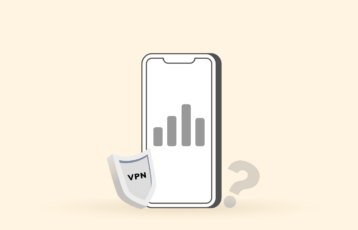A virtual private network or a VPN is the key to protecting your online security. However, the difficulty of installing VPNs on multiple devices prevents most users from using a VPN. Nonetheless, you still have one method that assures the utmost security without hassle – setting up a VPN on your router.
But how would you do that? Let’s find it all about VPN routers in this guide.
How to set up a VPN on your router – Quick guide
- Buy a VPN-compatible router or flash your existing router with compatible firmware like DD-WRT.
- Subscribe to a reputable VPN service like NordVPN that offers router clients.
- Download and install the VPN client on your router.
- Establish your VPN connection by entering account credentials.
- Connect your devices to the VPN-enabled router and start browsing safely.
Quick guide: How to set up a VPN on your router
Eager to install a VPN on your router right away? If you know the prerequisites, here’s a quick guide to get you started.
- Buy a VPN-compatible router or flash your existing router with a compatible firmware like DD-WRT.
- Subscribe to a reputable VPN service like NordVPN that offers router clients.
- Download and install the VPN client on your router.
- Establish your VPN connection by entering account credentials.
- Connect your devices to the VPN-enabled router and start browsing safely.
What is a VPN router? How does it work?
You already know about VPNs – they are wonderful programs protecting your online security with complete anonymity. Regardless of the operating system, you can install these VPNs on almost any smartphone or computer.
However, you may face trouble installing a VPN on any router.
That’s because not every router supports VPN installation, particularly those that your ISP provides you.
So, the market has something else for you – a dedicated VPN router!
VPN routers work just like regular routers. But they have the additional capability of supporting VPNs. These routers are relatively costly but work wonders to secure your network.
With VPN routers, you don’t need to install VPN separately on your devices. Instead, you can simply install a VPN client on the router, and the entire traffic generated from the router gets encrypted.
Wondering how it works?
Well, when you install a VPN on your device, here is how the data flow:
Your device → VPN client (data encrypted) → Your router → ISP → VPN server (data decrypted) → internet
Whereas, with a VPN router, the data flows like this:
Your device → your VPN router (the VPN encrypts the data) → ISP → VPN server (data decrypted) → internet
So, you see, both methods protect your online data. But the difference lies in the way it happens.
The first path encrypts data at the level of your device. Hence, it ensures security to your specific device running the VPN client regardless of which router or ISP you connect. However, any other device connecting to the router isn’t secure as it has no VPN.
Whereas the second route ensures security for every device connected to that router regardless of whether the device has a VPN or not.
This convenience makes a VPN router for a home network or closed office environment the perfect choice since you can secure every device with it, be it your computers, phones, smart devices, or gaming consoles.
Types of VPN routers
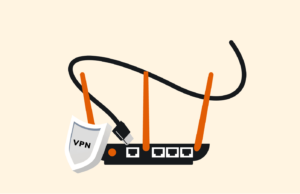
VPN routers can safely be classified into three categories depending on the supported installation method. You’ll either find a VPN router belonging to one of the three types or does not support VPN installation.
1. Pre-configured VPN router
If you don’t know how to install a VPN on a router and don’t have time to do that on your own, then getting a pre-configured router is the best option.
These routers come with pre-installed VPN clients. It means you don’t have to go through the hassle of finding a good VPN service, subscribing to it, and installing it on the router. Instead, you can buy them from services like Flashrouters.com, which typically sells VPN routers. Just let them know which service you wish to use on your router and leave the rest to them.
Pros:
- Saves time
- No technical knowledge required
- Get top-notch routers with the best VPN clients
Cons:
- Costly, since the service manages the hassle of VPN flashing and configuration for you
2. VPN-compatible router
The other type of router you can buy to protect your network is a VPN-compatible router.
These routers do not come with pre-configured VPNs. But they have their firmware designed to support VPNs. So, if you know how to install a VPN on a router, you can easily configure these routers with your preferred service.
These routers often support the OpenVPN protocol, making them compatible with most VPNs. However, you can always double-check for OpenVPN protocol support before investing in a new VPN router.
Pros:
- Relatively inexpensive than pre-configured VPNs
- Liberty to install any compatible VPN service
- No tedious configurations or flashing required
Cons:
- Not suitable for users with no knowledge of the best VPN services
Manually-flashed router
The third type, manually-flashed routers, does not support VPN installation because of firmware limitations. Therefore, you must manually flash them with firmware that supports VPN clients.
You can either flash them on your own or avail yourself of the services of third parties like Flashrouters.com. Once done, you can then install a it on the router you already have.
Pros:
- This a cost-effective method as you can potentially transform your regular router into a VPN router
- More choices for VPN installation
- Disable manufacturer backdoors and restrictions with firmware flashing
Cons:
- Flashing routers may void the router warranty
Two common types of such firmware are DD-WRT and Tomato. While both firmware offers similar functionalities, certain features make a Tomato VPN router different from a DD-WRT VPN router.
Briefly, Tomato offers better functionalities with the OpenVPN protocol. It also supports running up to two VPN servers at a time. Also, the overall interface is much better for most users. However, the firmware isn’t compatible with the majority of router models.
Whereas DD-WRT is compatible with many more routers as compared to Tomato. It gives the user more control over internet settings, including adjusting the WiFi signal strength, service quality per traffic, or extending your home network range. That’s why DD-WRT is more famous for flashing a VPN router for home use.
Why you need to install VPN on the router – the pros
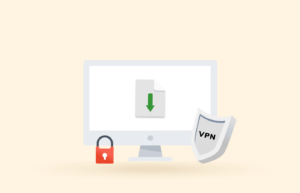
Before moving on to the detailed guide, let’s first understand why you should install a VPN on your router.
Of course, you can always opt for installing VPN apps on your devices. Still, having this software running on your router has its benefits. So let’s take a look.
1. Ensure thorough protection of your smart home network
Setting up a VPN on a router is inevitable for smart home users.
Why?
You can install a VPN on your smartphones, computers, streaming devices like Firestick, and even your gaming consoles.
But what about other smart devices? Can you install a VPN on your smart vacuum cleaners, microwave ovens, lawnmowers, thermostats, and other such appliances? You can’t.
Yet, these devices threaten your home security as they connect to your home network.
However, if you install a VPN service on the router, you also immediately secure these devices.
2. Increase the number of simultaneous device connections
Your regular VPN subscriptions allow a specific number of simultaneous connections. However, running them on a router lets you bypass this limit and connect all your devices to the VPN, according to the router’s capacity. Whereas your VPN will run smoothly considering the router as a single device connection.
3. Ensure 24/7/365 online security
No need to remember to connect your device(s) to VPNs. When you install a VPN on a router, your VPN connection will continue running if the router remains switched on.
4. Bypass geoblocking on all media systems
While a VPN allows you to bypass geo-restrictions, not every media system you own may support VPN installation. However, having one on your router will let you access blocked content on all your devices.
Problems arising if you install a VPN on your router – the cons
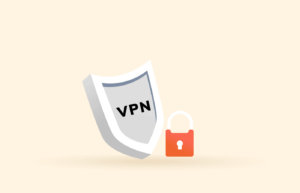
Although setting up a VPN on the router provides many benefits to you. However, it isn’t a foolproof strategy to protect your online privacy. You might face some troubles too.
1. Difficulty in adjusting VPN settings
You need another device connected to your router to access the dashboard and adjust VPN settings. That gets tricky when you need to switch your VPN server quickly.
2. Compromised encryption strength
Most routers may not support robust encryption protocols. Thus, you’re left with limited options to configure VPN protocols.
3. Unsecured connection between the devices and the router
As the VPN runs on your router, the data flowing between your device(s) and the router remains unencrypted, hence, vulnerable to snoopers. You need to apply strict security measures to protect your internal home network.
4. Trouble managing unauthorized connections
Some VPNs apply harsh policies to block unauthorized connections. However, you can always manage such connections by accessing VPN settings. However, due to the lack of a proper interface at the router level, you may face trouble adjusting the settings and allowing such connections.
Choosing the best VPN for your router (and 3 best router VPNs)
Now that you know how a VPN benefits you and have decided to install a VPN network on the router at your home, the question is, which service should you use?
Choosing the right VPN is the most critical thing for your online security. You cannot trust a free VPN for a router installation as you leave your entire network vulnerable to cyber threats. And, of course, you cannot risk your money to subscribe to just any random VPN service to install on your router.
Below, we quickly list the key factors you should consider.
- Fast connection speed
- Superior encryption (preferable, military-grade encryption)
- Reliable servers with greater choice
- No-logs policy
- Kill switch
- Affordable pricing plans
And, of course, a dedicated VPN client for your router.
You might need to perform extensive research to find the best VPN. But if you’re running short on time, here are our quick recommendations.
Our top recommended 3 VPN services
1. NordVPN
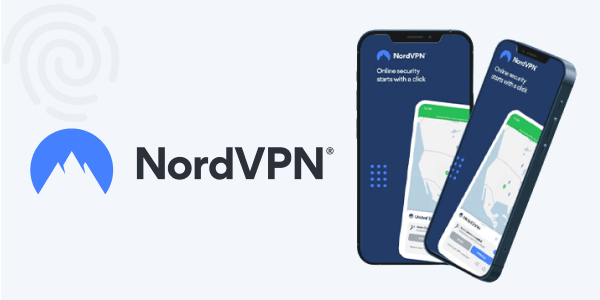
Our first recommendation to empower your router is NordVPN. Apart from the other devices, they also allow you to run their apps on routers. Hence, with a single account, you can protect all your devices.
Their website has shared a detailed list of routers compatible with NordVPN. Moreover, they have also demonstrated how to install NordVPN on the router in this video.
So, you can subscribe to their service to assess its feasibility for you. Also, the 30-day trial with a money-back guarantee keeps your money remains safe.
2. Private Internet Access
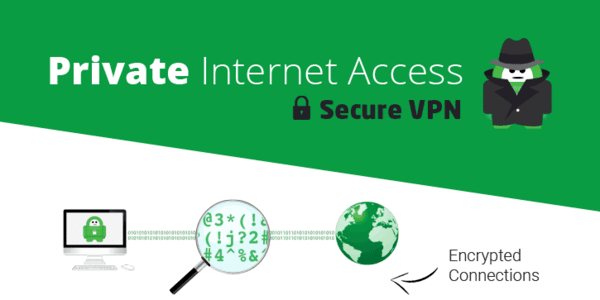
This VPN market has reached the top only because of its superior services. It is evident from the fact that PIA also supports router installation.
The service provider has even shared detailed tutorials on their website, explaining how to set up PIA on a router.
Also, they offer very cheap pricing plans and a money-back guarantee. Hence, you can assess their services without worrying about your money. And, if you find it working for you, keep all your worries aside, as PirvateInternetAccess VPN supports unlimited device connections with a single account.
3. ExpressVPN

As for any other device, ExpressVPN comes second on the list of the best VPNs for routers. The service providers know and understand the need for robust end-user security. Therefore, they also offer a dedicated ExpressVPN router client as well.
So, whether you get a pre-configured VPN router or a VPN-compatible one, you can subscribe to ExpressVPN and install it on your router.
Also, you can order a VPN router from their website, which will come with this VPN by default.
How to set up router VPN – a step-by-step guide
Done with choosing your VPN service provider?
Good.
Now let’s start with how to install a VPN on the router at your home.
P.S. This step-by-step guide doesn’t apply to the pre-configured VPN routers since they already have everything ready for you. Nor do you need it for VPN-compatible routers as they require no flashing. You can simply visit your VPN providers’ website and follow their tutorial to install VPN on router.
Hence, we’ll take a look at setting up a VPN on the router requiring manual flashing.
Also, ensure your router manual is in hand since you’ll need to know the exact procedure of flashing your specific router model. Our guide below is simply a generic one for all routers.
1. Download the firmware for your router

Choose either of the DD-WRT and Tomato firmware to flash your router as per the router compatibility. Once you decide, download the firmware since you need to install it on your router immediately after flashing.
2. Connect primary and secondary routers
In most cases, you’ll need to connect two routers where your primary router will run the VPN client. Although, this doesn’t apply to some routers like Linksys that solely work as primary routers.
So, configure your primary router so that it allows VPN. Then, connect an Ethernet cable to the WAN port of your primary router, and connect its other end to the LAN of your secondary router.
After that, you can connect your computer or any other device to your primary router either wirelessly or with an Ethernet cable connecting to its LAN port.
3. Flash the router
Once you connect the router(s), flash them according to the user manual’s instructions (s). If you can’t find these instructions in the manual, you can easily search them online by typing the respective router model(s).
4. Install VPN on the router

Now that you have set up your router to run a VPN, it’s time to install it on the router.
To do this, you need to enter your router configuration dashboard. Then, you must enter the VPN server name, IP address, and VPN account credentials to the respective VPN configuration page.
After entering all the details, choose the VPN protocol and add CA certificate keys and all required information. Save the changes.
And this is it; your router should now work as desired. Next, you can connect to the internet and check your connection’s IP address. If your location appears different, check the connection for possible IP leaks and protect the respective leak sources.
After successfully setting up a VPN on the router, you can trust that your entire home network is secured from snoopers, online trackers, and other perpetrators.
